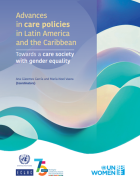1 - 10 of 10 Results
Date:
El documento de trabajo “Política exterior feminista: Soluciones para un mejor mañana” recopila los principales insumos preliminares, propuestas y recomendaciones emanadas de las sesiones de la III Conferencia Ministerial sobre Política Exterior Feminista, que tuvo lugar en la Ciudad de México del 1 al 3 de julio de 2024. La III Conferencia generó un espacio de diálogo entre actores comprometidos con la ejecución de políticas exteriores con perspectiva de género y feminista para compartir buenas prácticas, lecciones aprendidas y desafíos comunes de implementación, y desde allí identificar soluciones innovadoras rumbo a las negociaciones del Pacto del Futuro que se acordará en el marco de la Cumbre del Futuro en septiembre 2024.
Date:
The Women, Local Economy, and Territories (MELYT) program implemented by UN Women, the United Nations entity dedicated to promoting gender equality and women's empowerment and funded by the Italian Ministry of Foreign Affairs and International Cooperation (MAECI), through the Italian Agency for Development Cooperation (AICS), promotes the economic empowerment of rural women for the development of strong local economies, more equitable societies, and a better quality of life.
Date:
The UN Women Regional Office for the Americas and the Caribbean presents the regional report to analyze the progress of indicator 5.c.1 in the region. In 2021, 10 Latin American and Caribbean States, Bolivia, Brazil, Chile, Colombia, Dominican Republic, Ecuador, El Salvador, Guatemala, Panama, Paraguay and Panama, sent their responses to the voluntary questionnaire that measures progress towards indicator 5.c.1 of the SDGs. In this way, a more detailed view of the progress of indicator 5.c.1 in the region is sought, with the objective of promoting actions and policies that promote gender equality and the empowerment of women. It is important to note that the involvement and cooperation of the countries in the submission of data is fundamental to strengthen this type of report and generate a positive impact on the promotion of equality in the region.
Date:
The objective of this document is to compile good practices in gender budget initiatives by mapping the main advances in regulations, instruments, and tools developed in the countries of the LAC region and, based on these lessons learned, to draw up a road map that will serve as a reference framework to guide the development of new experiences and help consolidate existing ones.
Date:
The document begins by analysing international human rights instruments and references to care issues at the constitutional level in the countries of the region. National regulatory frameworks are then examined, along with laws on comprehensive care systems; maternity, paternity and parental leave; breastfeeding protection laws; and the regulation of care services. Data for the analysis are taken from the Gender Equality Observatory for Latin America and the Caribbean,1 a repository of laws and regulations on care. This repository provides official information from member States of the Economic Commission for Latin America and the Caribbean (ECLAC) and facilitates the monitoring of international agreements on women’s rights.
Date:
Business Case - Report on Equality Means good business: gender contribution to business, best practices and suggested KPIs framework
Date:
This working paper provides a framework for women’s economic empowerment, which draws on lessons learned, key strategic documents, and expertise generated by the implementation of the MELYT Programme focusing on women, the local economy, and dynamic territories in the Trifinio area2 of Central America
Date:
Conducted within the scope of the “Win-Win: Gender equality means good business” programme, which is implemented by UN Women together with the International Labour Organization (ILO) and funded by the European Union (EU), this research aims to know the impact of sexist advertising on brand positioning.
Date:
The Policy Brief "Domestic Workers in Latin America and the Caribbean during the COVID-19 Crisis", prepared jointly by UN Women, ILO and ECLAC, illustrates the situation of special vulnerability faced by domestic workers in Latin America and the Caribbean, highlighting the impacts of the current crisis caused by COVID-19. It also describes the measures promoted by social actors and institutions in the countries of the region and makes visible how much can still be done to guarantee the labor rights of domestic workers.
Date:
In order to make progress in achieving significant equality in the country, it is necessary to analyze the conditions in which discrimination and gender gaps occur. Through this scenario, UN Women, in partnership with the Government of Colombia through the DANE, developed the flagship report "The Progress of women in Colombia 2018: transforming the economy to guarantee rights", a study that contributes to promoting accurate information that allows for the analysis and implementation of concrete actions so that the country fulfills its commitments to the Sustainable Development Agenda for the Year 2030.










